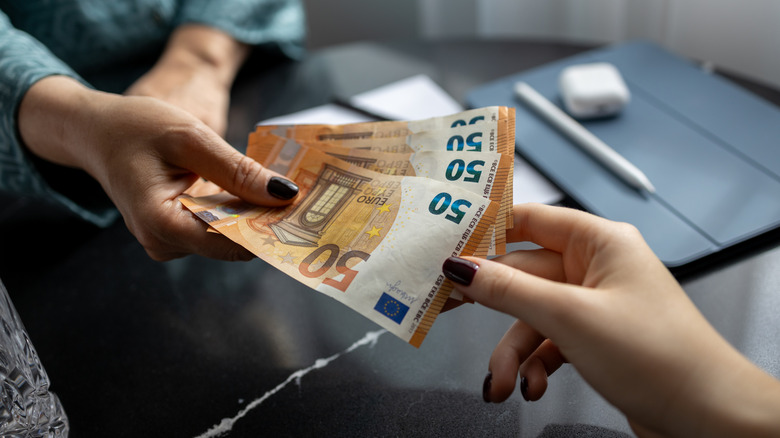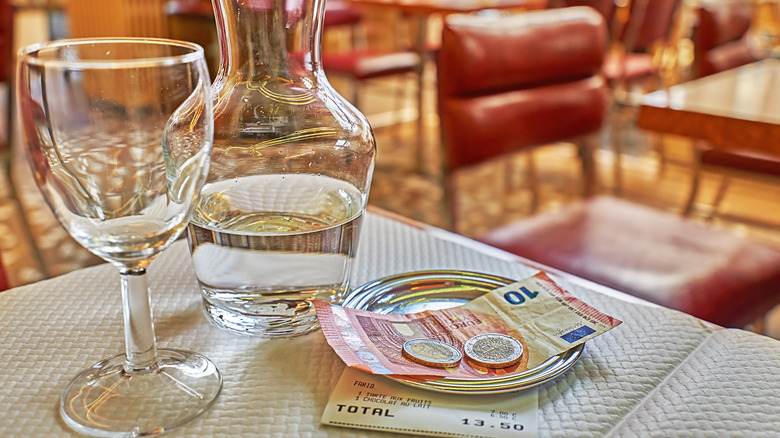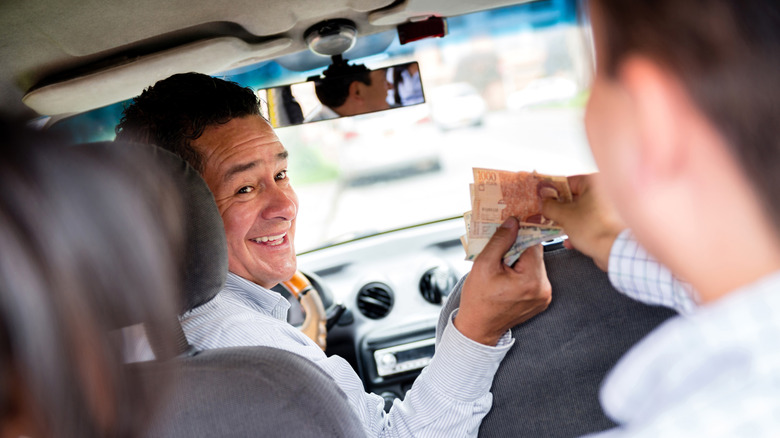American Tipping Habits That Are Considered Rude In Germany, According To Rick Steves
You just ate a wonderful meal at a restaurant in Germany, left a few coins on the table, and got up to leave. You might think your server should feel gratitude for the tip, right? Perhaps not. It may seem common for Americans to think that tipping is a universal expectation, but tipping culture in Europe is different from in the States. Even within Europe, it's important to understand that the tipping culture in London may not be the same as elsewhere in the continent, and that what is considered rude or inappropriate in one country will not necessarily be so in another country.
That is something to be careful of when tipping in Germany, and there are a few ground rules that every traveler should get acquainted with when planning to travel there. Luckily, renowned world traveler Rick Steves shared insights about tipping on his blog. "Rather than leaving coins behind on the table (considered slightly rude), locals usually pay directly," Steves writes, recommending instead that you hand your paper money tip to the server directly when they come to settle the bill. This is particularly true "in busy places where the wrong party might pocket the change," Steves says.
Key differences between American and German tipping habits
While Americans are accustomed to tipping between 15 and 20% of the bill, tipping habits in Germany are a lot different. Instead of leaving a fixed percentage, the most common thing to do is to round up the bill, even if it means leaving only a few extra euros. You can't really go wrong with tipping in Europe, as it's not perceived as a necessity the way it is in the United States. Instead, it's a token of appreciation if you were happy with the service. In general, most Europeans tend to leave a euro or two for each member of their party.
What may be more important than the amount or percentage when in Europe is the manner in which the tipping is approached. A great way to tip in Germany is to hand the money to your server and state the total amount you would like to pay. "For example, if paying for a €10 meal with a €20 bill, say 'Eleven, please' (or 'Elf, bitte' if you've got your German numbers down) while handing your money to the server," Steves says. "The server will thank you, keep a €1 tip, and give you €9 in change."
Unlike American culture, tipping is more of a personal interaction in dining etiquette, so leaving coins on the table could easily be interpreted as dismissive or unappreciative. If you're worried about how to tip or are unfamiliar with the tipping culture in a specific country, it is best to ask a local for guidance.
How to tip like a local in Germany
Learning key phrases in German will help you easily master tipping like a pro. For example, "stimmt so" is commonly used in German tipping culture. Translated literally, it means "it's okay," and is similar to how Americans would say "keep the change." Don't forget to say please ("bitte") and thank you ("danke schön") to show your respect and appreciation to your server. Steves also mentions that tips are usually expected when dining in, but not if you're opting for take away or grabbing coffee at a cafe to go.
If you're using a taxi, it is customary to tip the driver by rounding up the amount. "For a typical ride, round up to the next euro on the fare (to pay a €13 fare, give €14); for a long ride, to the nearest 10 (for a €76 fare, give €80)," Steves writes. He also encourages you to throw in a bit more if you're particularly impressed with the service, for example if the driver carries your bags. Remember that tipping is only expected for good service, so "if you feel like you're being driven around in circles or otherwise ripped off," Steves says, "skip the tip."
If you're wondering about tipping habits while staying at a hotel, if the bellman assists you with luggage, it is customary to hand them 1 to 2 euros per bag, while at the reception desk or concierge, the tip could be increased to €5. Remember that smiles, eye contact, and saying "danke" are all appreciated in German tipping culture.


